In Japanese, you 用 means various things: it refers to something you have to do, a "task" or "business" you have to care of; the "use" of a thing in doing a task; "for what task" is a thing suitable, its "purpose;" and to refer to the usefulness of a thing in the sense of how many uses it has, what tasks it can do, its "purposefulness."(日本国語大辞典:用)
- you ga aru
用がある
[I] have business to do [with you].
I have something to discuss with you. - you ni tatsu
用に立つ
[This thing] "stands up" to the task.
[This thing] is useful for doing this task. - yourei
用例
Usage example. Example of use. - keiko-you no katana
稽古用の刀
A sword for use in sparring. A training sword. (e.g. a "wooden sword," bokutou 木刀.)
Manga: Shijou Saikyou no Deshi Ken'ichi 史上最強の弟子ケンイチ (Chapter 7)
Manga: Fullmetal Alchemist, Hagane no Renkinjutsushi 鋼の錬金術師 (Chapter 2)
Manga: Holy Land, ホーリーランド (Chapter 6)
Manga: Goblin Slayer, ゴブリンスレイヤー (Chapter 5)
Usage
Sometimes you 用 is used as a standalone word with various somewhat related meanings, while other times it's used as a morpheme in a multi-kanji word. We'll take a look at both in this article.
Thing You Have to Do
The word you 用 itself may refer to a thing you have to do, a task you have to take care of.
- you ni tatsu
用に立つ
[For something] to stand up to the task.
[For something] to be useful in doing a task.- c.f.: yaku ni tatsu
役に立つ
[For something] to stand up to a role.
[For something] to be useful, to be appropriate for the role it will have.
- c.f.: yaku ni tatsu
- you ga sundara...
用が済んだら・・・
After the task is done...
After [it] is finished...- koto ga sundara
ことが済んだら
When the thing is done... (can be used to say "the thing you WILL do" rather than "the task you HAVE to do.")
- koto ga sundara
- youji
用事
A thing to do. A task. An errand.- youji ga dekita
用事ができた
A task has been made [for me]. (literally.)
I got something new to do. A new task to attend to. (e.g. when changing plans, because now you have a task to do.)
- youji ga dekita
- youken
用件 - zatsuyou
雑用
Miscellaneous tasks. Chores. Odd jobs.
To Go to The Toilet
One of the things people HAVE to do is going to the toilet. Attending to the nature's call. And funny enough the word you 用 can be used to refer to this super important task you gotta do on the throne:
- you wo tasu
用を足す
To finish a task. To take of a task.
To go to the bathroom relieve yourself. - shouyou
小用
Small matter. Small business.
Urination.- c.f. shouben 小便, "urination," "urine."
- daiyou
大用
Big matter. Important business.
Defecation.- c.f. daiben 大便, "defecation," "feces."
Business With Someone
The word you 用 can mean "business" in the sense of something you have to do. Usually it's "business" you have with someone, i.e. you have to talk with them about something. However, it can also be used in other ways. For example:
用がある
The phrase you ga aru 用がある, literally "business exists," is used to say you "have business" with someone.
- Tarou ga {Hanako ni you ga aru}
太郎が花子に用がある
{There's "business" for Hanako} is true for Tarou.
Tarou has "business" with Hanako.
Tarou has something to discuss/needs to talk with Hanako.
- c.f.:
- Tarou ga {Hanako ni yousha ga nai}
太郎が花子に容赦がない
{There's no mercy for Hanako} is true for Tarou.
Tarou is merciless with Hanako.
Tarou doesn't hold back against Hanako.
- Context: a character tries to talk with some guy, but is blocked by his bodyguards or something like that.
- ore wa {soitsu ni you ga aru}!
俺はそいつに用がある!
I have business with that guy!
- doke!
どけ!
Get out of my way!
- doke!
- Context: Kamishiro Yuu 神代ユウ has gotten in a fight with delinquents, who are now searching for him. They find someone who knows him. Seeing this, Yuu says:
- sono hito... Kaneda-kun wa mukankei nanda, onaji gakkou na dake de
その人・・・金田君は無関係なんだ 同じ学校なだけで
That person... Kaneda-kun has nothing to do with [this], [he]'s just from the same school [as me].
- onaji gakkou na dake de mukankei nanda - he's just from the same school, and has nothing to do with our fight.
- you ga aru no wa boku dake daro!!?
用があるのは僕だけだろ!!?
The one [whom] {[you] have business with} is just me, [isn't it]?
I'm the only one whom you have business with, am not I?
It's me you want, isn't it?- Let Kaneda-kun go!
用がない
The phrase you ga nai 用がない means literally "there isn't business," i.e. "you don't have business to talk with someone."
- {you ga nai} nara kaere
用がないなら帰れ
If {[you] don't have business}, return.
If you don't have anything to discuss, go home.
If you don't have anything to do here and you're going to stand there being an eyesore, get out. - Context: a strong character easily fights a horde of enemies while trying to reach their far more powerful leader.
- zako ni wa {you wa nee}-n-da yo
雑魚には用はねぇんだよ
I don't have business with small-fry (like you guys).
- Contrast: but I do have business with your leader.
- i.e.: I'm not here to fight you insects, I'm here to fight your boss.
- I don't have time for y'all weaklings.
- Context: someone asks Goblin Slayer for help with a thing, but he refuses, because:
- goburin igai ni you wa nai
ゴブリン以外に用はない
[I] have no business with anything but goblins.- If it isn't about goblins, I'm not interested.
To Have Business With Things
The phrase you ga aru isn't limited to people whom you discuss stuff with. It can also be used when your "business" is with a thing, which, in practice, is probably never gonna happen, but this can show up in anime when a character needs to interact or examine an object and someone stands in their way.
- ore wa {sono inu ni you ga aru}
俺はその犬に用がある
I have business to do with that dog. - ore wa {sono ki ni you ga aru}
俺はその木に用がある
I have business to do with that tree.
何か用
The phrase nanika you 何か用 (or なにかよう, etc.) is used to ask "what business" someone has with you, if any.
- anata ga {watashi ni nani-ka you ga aru} no ka?
あなたが私に何か用があるのか?
Do you {have any business with me}?
Is there something you want to discuss with me?
How can I be of help?
How can I be of use? - nani ka you?
何かよう? - nani ka you ga arimasuka?
何か用がありますか? - nani ka you ga aru-n-desu ka?
何か用があるんですか? - nanka you?
なんかよう?
The word nanika なにか isn't a word, but two: nani 何, "what," an interrogative pronoun, and the ka か particle. When ka か comes after an interrogative pronoun, it becomes indefinite, so nani-ka doesn't mean "what" thing, but "some" thing.
The phrase nani-ka you refers to "some business" that may exist, but that the speaker doesn't know what it would be yet. Compare with:
- doko
どこ
Where. - doko-ka
どこか
Somewhere. A place that may exist, but that we don't know where it is yet.- kanarazu doko-ka ni iru
必ずどこかにいる
[I'm sure] [he] is somewhere. (no idea where, though, but he's somewhere.)
- kanarazu doko-ka ni iru
- Context: Satania sees Gabriel doing a thing, calls her attention.
- chotto Gaburiiru!
ちょっとガブリール!
Hey, Gabriel!- Symbol: realization mark.
- uwa...
うわ・・・
Ugh... - Sataanya...
サターニャ・・・
Satania... - nande {iya-sou na} kao sun'no yo!!
なんで嫌そうな顔すんのよ!!
Why are you making a face {like [you] don't want to deal with [something]}.- iya-sou da - to appear to be iya.
- iya da - "no," typically used in response to something you don't like or would rather not do, to be against doing, handling or getting involved with.
- sun'no - contraction of suru no するの.
- X kao wo suru 〇〇顔をする - to make a face that is X.
- nanka you?
なんか用?
[Do you want something]?
- Context: Kousaka Shigure 香坂しぐれ, a ninja-esque swords and weapons master, practices the fine art of cutting blades with a blade.
- chi, kin, chin, kyoun, kin
チン キン チン キョウン キン
*sound effect of blades being cut.* - dosu'
ドスッ
*sound effect for blade falling in the tatami floor.* - oi!! boku ni nani ka you ga aru no ka?
おい!!ボクに何か用があるのか?
Hey!! Do [you] have any business with me? - giku'
ギクッ
*gulp* - a, iya, sono...
あ、いや その・・・
Ah, erm, that is...- All these three words are interjections.
- nani ka you deshou ka?
何か用でしょうか?
[Is there something that you want to discuss with me]? - hanashi wo ima shiten'no wa kono ore da'!
話を今してんのは このオレだッ!
I'm the one talking right now!- shiten'no - contraction of shite-iru no しているの.
- dare ga shitsumon shite ii to itta'!?
誰が質問していいと言ったッ!?
Who said [it] was alright to ask questions!? - kono boke ga'!
このボケがッ!
[You] idiot!
何のようだ
The phrase nan'no you da 何のようだ (or 何の用だ, etc.) is another way to ask "what business" you have with someone, only this time it literally means "what business is [it]." This phrase exceptionally seems to feature you よう in hiragana more frequently than in kanji.
Note: dono you na どのような means instead "what sort of." This is the "appearance" you 様, not the "business" you 用.
Purpose
The word you 用 may be used to say something "has an use," that you "have an use for" a thing, in the sense that the thing has a purpose, an utility, in doing some task. A function.
- {you no {naku} natta} kodomo-fuku
用のなくなった子供服
Children clothes [that] {became {without} purpose}. (literally.)
Children clothes that lost their utility.
Children clothes that you have no use for anymore.
[Old] children clothes.- If the purpose of the clothes was to be worn by a child, and the child grew up, the clothes lost their purpose. They have no utility, no usefulness left. They're useless now. You have nothing left to do with them.
- yuuyou
有用
Having utility. Serving a purpose.
Being useful [for a task]. - muyou
無用
Lacking utility. Not serving any purpose.
Not being useful [for a task]. (and therefore...)
To be unnecessary. There's no reason to do this, if doing this is useless. - youto
用途
Uses. Usefulness. (in the sense of how many things it can be used for.)- youto ga hiroi
用途が広い
[Its] usefulness is vast. [It] is versatile in use. - tsukai-michi
使い道
Path of use. (literally.)
Way or ways to use a thing (as in for different purposes).- tsukai-michi ga nai
使い道がない
[It] has no path-of-use.
It can't be used for anything.
It's useless.
- tsukai-michi ga nai
- youto ga hiroi
- you-zumi
用済み
Business-finished. (literally.)
(For a thing used in a task) to be done with.
To have no use for a thing anymore, as it already fulfilled its purpose.- ~zumi - ~sumi 済み affected by rendaku 連濁, noun form of sumu 済む, "to end," as in, in this case, "its utility ended."
- Context: bad guy joins badder guys to gain evil powers to do bad things, does bad things, gets caught, gets discarded (killed) by the badder guys who were just using him somehow for their nefarious plans.
- anata, mou you-zumi yo
あなた もう用済みよ
You, are already you-zumi.
You have already served your purpose.
We don't need you anymore.
We're done with you now.
Purpose Suffix
A suffix you 用 can refer to what something will be used for. What comes before it can be basically anything: the user of a thing, the time when to use it, the location where to use it, the action it's done using it, etc.
- kodomo-you no jitensha
子供用の自転車
A bicycle for use by children. - natsu-you no boushi
夏用の帽子
A hat for use during summer. - sabaku-you buutsu
砂漠用ブーツ
Boots for use in the desert. - Context: it's said that an otaku オタク will buy the same figure three times. For what?
- kanshou-you
鑑賞用
For looking at.
To appreciate.
- kanshou suru
鑑賞する
To appreciate. (an artwork.)
- kanshou suru
- hozon-you
保存用
For storing.
To preserve.- hozon suru
保存する
To store. To preserve.
To save data in a computer.
- hozon suru
- asobi-you
遊び用
For playing with.- asobu
遊ぶ
To play. To have fun doing something.
- asobu
- Context: new servants learn about their cleaning tools and the mansion they have to clean.
- kore mo souji dougu desu ka?
これも掃除道具ですか?
These are cleaning tools, too? - kinkyuu-you nee
緊急用ねぇ
For emergencies, [yes].
To use in emergencies, [yes].
- Note: the teaching character way of speaking features using a long vowel at the sentence end where there wouldn't normally be one, e.g. nee ねぇ instead of ne ね.
- {metta ni} {tsukawareru} koto wa nai waa
滅多に使われることはないわぁ
{[For them] to be used} {rarely} happens.
It's rare for them to be used.- tsukawareru - passive form of tsukau 使う, "to use."
- metta ni ~nai - for something to rarely occur.
- acchi no kaidan wa doko e tsunagatte-iru-n-desu ka?
あっちの階段はどこへつながっているんですか?
Those stairs are connected toward where?
Where do those stairs lead to? - kicchin ya randorii yoo
キッチンやランドリーよぉ
The kitchen and laundry.
To Use
The morpheme you 用 is part of several words referring to "using" something or someone somehow for some task. Let's see some of this vocabulary.
To begin with, you 用 is the on'yomi 音読み reading of the kanji, there's also the kun'yomi 訓読み, which is:
- mochiiru
用いる
To use.
This is synonymous with:
- tsukau
使う
To use. - shiyou suru
使用する
To use.- Not to be confused with:
- shiyou
私用
"My" use. Private use. (in the sense of using a tool for one's own benefit, rather than for the benefit of a company that hired you to use that tool, e.g. you have a work shovel to use at work, and your own shovel to use in your own backyard.)
Private business.- Antonym: kouyou 公用, "public use," "government business."
However, there are a few differences between the words above.
The verb tsukau is more commonly used in spoken speech, and it has broader uses, while mochiiru is more commonly used in written speech, it's more formal, and its uses are limited to saying what one should use to a task, or what they used for a task. Notably:(デジタル大辞泉:用いる)
- atama wo tsukau
頭を使う
To use [your] head.
To think. - atama wo mochiiru
頭を用いる
To use [a] head. (literally—or the head, of something or someone, in some task.)
*To think. (can't be used this way.) - kokoro wo (*tsukau/mochiiru)
心を(*使う/用いる)
To use [your] heart. Mind. Feelings. (literally.)
To pay attention [to something]. To be careful. To be concerned with details. (in order to make sure nothing goes wrong.)- Here, only mochiiru works, not tsukau.
- ten'in wo san'nin (tsukatte-iru/*mochiite-iru)
店員を三人(使っている/*用いている)
To be using three people as store employees.
To have three people working as store employees.- tsukau can be used in the sense of "to have people working as," but mochiiru can't be used in this case.
- shin'nin wo (tsukau/mochiiru)
新人を(使う/用いる)
To use the newbie. The new guy. The new employee.- Both verbs can be used in the sense of appointing someone to a role, so you "use" them in that role.
As for shiyou suru, it's more formal than tsukau, so it's found more in writing, but the meaning is basically the same. It just happens there are some phrases that always use tsukau.
- ki wo tsukau
気を使う
To use one's ki. (literally.)
To pay attention to [someone]. (e.g. by doing them a favor because it seems they need help.) - ki wo shiyou suru
気を使用する
To use one's ki. (in a task.)
*To pay attention to [someone]. (can't be used this way.)- This basically only makes sense in a series like Dragon Ball where ki is some sort of magic power.
Another word that can translate to simply "to use" is:
- riyou suru
利用する
To use [a thing or person] in a way that benefits you.
To use a product with its intended beneficial purpose.
To make use of a thing for your advantage.
To use a person as a pawn in your grand strategy.- He's just using you!
- kanojo wa riyou sarete-iru
彼女は利用されている
She's being used. (because she has exclusive access to some information, location, or person, or has some ability, etc.)
Necessary Resources
Sometimes, you need certain things to do a task, in other words, the task "uses" certain things.
- yougu
用具
Tool. Equipment. (used in doing a task.) - youshi
用紙
Paper for use. (blank for writing on, or for filing a form, etc.) - youchi
用地
Site. (as in a piece of land used to do a task.) - youryou
用量
Amount used. Dose.- Homonym: youryou 容量, "capacity."
- youdo
用度
Supplies. (in a company or office.) - hiyou
費用
Cost. Expense.
Vocabulary
For reference, some other more related words:
- shin'you suru
信用する
To entrust a task to [someone].
To trust that [someone] will be of use. - aiyou suru
愛用する
To love using [a thing]. To have [a thing] as your favorite to use for a task. - katsuyou suru
活用する
To put in use in practice. (e.g. one's skills, training.)
To apply. (what one learned.)
To do good work [in an occasion]. (by putting their skills to use, etc.) - nin'you suru
任用する
To appoint [someone] to a role.
To give [someone] a responsibility. - kiyou suru
起用する
To make use [someone] by promoting them to a role where they'll be effective. - tsuuyou suru
通用する
To be commonly used around. To circulate.
To have the same effect on [something] as it typically does with other things. To work on. (e.g. lies "don't work" on me even if they may work on someone else, poison attacks don't work on this monster, etc.)- c.f. tsuujiru 通じる in the sense of: for a word to be understood by someone else, e.g. "skinship" is understood in Japanese, but it doesn't tsuujiru to native English speakers, they won't understand what it means.
- tekiyou suru
適用する
To make use of [a law, a contract clause, a rule].(goo.ne.jp:応用/適用)- i.e. you have a rule that says you're entitled to something in a scenario, so if such scenario arises, you "make use" of the rule to get what you're entitled to. You apply it.
- ouyou suru
応用する
To apply [a theory, a technology, a method, an idea] to solve a problem.(goo.ne.jp:応用/適用)
- e.g. "applied physics," ouyou-butsuri-gaku 応用物理学
- ouyou-ryoku
応用力
Adaptability. The ability to apply stuff in order to solve new problems. (e.g. puzzle solving, like making a rope out of blankets "to use it" to climb a wall and the sort.)
- saiyou suru
採用する
To adopt the use of [a thing]. - chouyou suru
徴用する
To draft [citizens].
To make use of [citizens] by forcing them to do a job. - un'you suru
運用する
To make good use of [something].
To effectively manage [funds, an operation]. - akuyou suru
悪用する
To use maliciously.
To abuse. To misuse. - ran'you suru
乱用する
To use thoughtlessly.
To abuse. To use excessively.
To misuse. To use improperly. - fukuyou suru
服用する
To take medicine. - yourei
用例
Example of use. - youhou
用法
Method of use. Usage directions. How something is (should be) used. - youjin suru
用心する
To take precautions. To worry about possible problems and do something in advance.
- youjinbukai
用心深い
Cautious. - youjinbou
用心棒
Bodyguard.
- youjinbukai
- yoi suru
用意する
To prepare [a thing] that will be used later. To arrange. To have it ready. - X-sen'you
〇〇専用
For exclusive use by X.
X's personal [something].
- sen'youki
専用機
Personal machine. (e.g. in a mecha anime, a giant robot that's for exclusive use of some character, typically some boss character, and looks unique somehow, as opposed to the mass-manufactured units that look all the same and any soldier can pilot.)
- sen'youki
Right: Wakabayashi Iori 若林伊織
Anime: Ojisan to Marshmallow, おじさんとマシュマロ (Episode 3)
- Context: an ojisan おじさん came to the wrong
neighborhoodtrain car. - josei-sen'you-sha
女性専用車
Female exclusive-use car.
Women-only car.- In the sense of a car that can only be used by women.
References
- 応用/適用 - dictionary.goo.ne.jp, accessed 2022-07-08.
- 用 - 精選版 日本国語大辞典 via kotobank.jp, accessed 2022-07-08.
- 用いる - デジタル大辞泉 via dictionary.goo.ne.jp, accessed 2022-07-09.
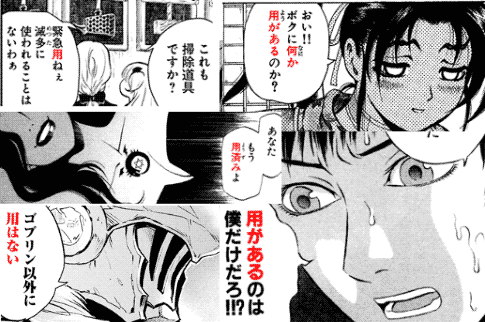

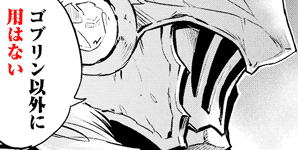
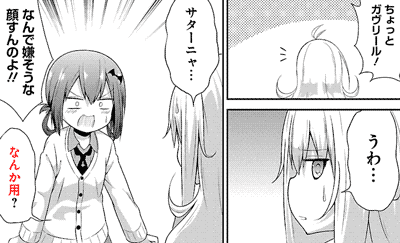
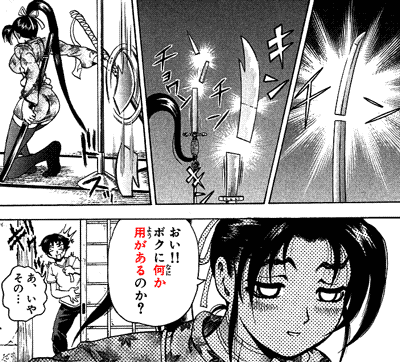

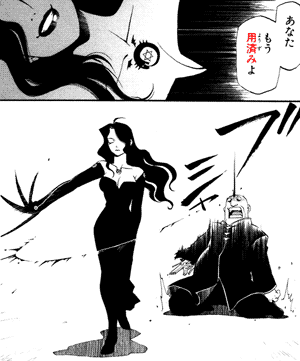
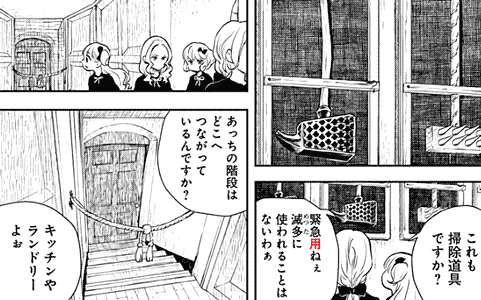

No comments: